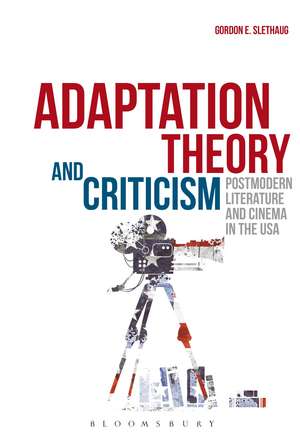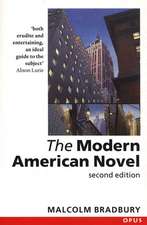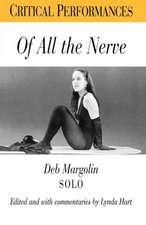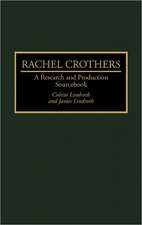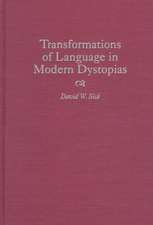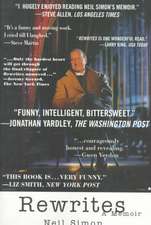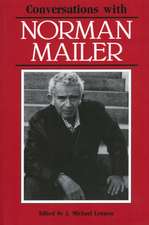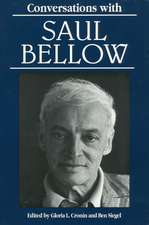Adaptation Theory and Criticism: Postmodern Literature and Cinema in the USA
Autor Gordon E. Slethaugen Limba Engleză Hardback – 13 aug 2014
| Toate formatele și edițiile | Preț | Express |
|---|---|---|
| Paperback (1) | 239.14 lei 6-8 săpt. | |
| Bloomsbury Publishing – 13 aug 2014 | 239.14 lei 6-8 săpt. | |
| Hardback (1) | 832.65 lei 6-8 săpt. | |
| Bloomsbury Publishing – 13 aug 2014 | 832.65 lei 6-8 săpt. |
Preț: 832.65 lei
Preț vechi: 1066.04 lei
-22% Nou
Puncte Express: 1249
Preț estimativ în valută:
159.32€ • 166.82$ • 132.15£
159.32€ • 166.82$ • 132.15£
Carte tipărită la comandă
Livrare economică 10-24 aprilie
Preluare comenzi: 021 569.72.76
Specificații
ISBN-13: 9781623560287
ISBN-10: 1623560284
Pagini: 288
Ilustrații: 12 bw illus
Dimensiuni: 152 x 229 x 28 mm
Greutate: 0.54 kg
Ediția:New.
Editura: Bloomsbury Publishing
Colecția Bloomsbury Academic
Locul publicării:New York, United States
ISBN-10: 1623560284
Pagini: 288
Ilustrații: 12 bw illus
Dimensiuni: 152 x 229 x 28 mm
Greutate: 0.54 kg
Ediția:New.
Editura: Bloomsbury Publishing
Colecția Bloomsbury Academic
Locul publicării:New York, United States
Caracteristici
Accessibly aggregates the existing arguments/criticism, and offers potential new avenues of research and scholarship
Notă biografică
Gordon E. Slethaug is a professor at the University of Waterloo, Canada, where he teaches English Language and Literature and researches contemporary American literature and film, globalization and communications, and international education. He is also honorary professor in Arts at the University of Hong Kong, China, and has recently been visiting professor of English Studies at the University of Southern Denmark.
Cuprins
IntroductionChapter 1. Modernism/Postmodernism and Origin/Intertextual Play in Adaptation Theory Chapter 2. Adaptation, Surplus Value, and Supplementation in Six Degrees of Separation and Short Cuts 2.1 Surplus, Supplementation, and Transformation in John Guare's Six Degrees of Separation 2.2 E Pluribus Unum: Raymond Carver's Fiction and Robert Altman's Short Cuts Chapter 3. Intertextual Doubling in The Age of Innocence, Gangs of New York, and The Great Gatsby 3.1 Tribalization as Intertextual Symptom: Scorsese's The Age of Innocence and Gangs of New York 3.2 Ironized Intertextuality: The Age of Innocence and The Great GatsbyChapter 4. Freeplay, Citation, and Ethnocriticism: Single and Multiple Sources in Smoke Signals, Smoke, and Do the Right Thing 4.1 Ethnocriticism and Adaptation: Sherman Alexie's The Lone Ranger and Tonto Fistfight in Heaven and Chris Eyre's Smoke Signals 4.2 From Lee to Auster and Wang: Postmodern Indeterminacy and Racial Relations in Do the Right Thing and SMOKEChapter 5. Palimpsests and Bricolage: Playful and Serious Citation in Broken Flowers and Snow White's Offspring 5.1 Palimpsest, Play, and the Myth of Filiation in Broken Flowers: Clues, Signs, and Referential Mania 5.2 Snow White's Offspring: The Hyper-PalimpsestConclusionWorks CitedIndex
Recenzii
Gordon E. Slethaug's ambitious and well-documented study proposes both to present a more systematic account of adaptations and the theories they have generated and to situate these texts and theories more firmly in a post-structuralist context. Whether or not they are persuaded by his analysis, readers interested in adaptation will be arguing about this book for a long time to come.
Adaptation Theory and Criticism is a timely and welcome contribution to adaptation studies. Turning a postmodern lens on 'American adaptations, supplementations, and citations,' Slethaug generates fresh, incisive readings of an array of adaptive texts, ranging from acclaimed works by Scorsese and Altman to overlooked gems by Wang, Eyre, and Jarmusch (to name but a few). In the process, Slethaug asks us to regard anew contemporary American art and culture, and consider the productive role postmodern theories might play in the analysis and understanding of adaptation.
Adaptation Theory and Criticism is a timely and welcome contribution to adaptation studies. Turning a postmodern lens on 'American adaptations, supplementations, and citations,' Slethaug generates fresh, incisive readings of an array of adaptive texts, ranging from acclaimed works by Scorsese and Altman to overlooked gems by Wang, Eyre, and Jarmusch (to name but a few). In the process, Slethaug asks us to regard anew contemporary American art and culture, and consider the productive role postmodern theories might play in the analysis and understanding of adaptation.
